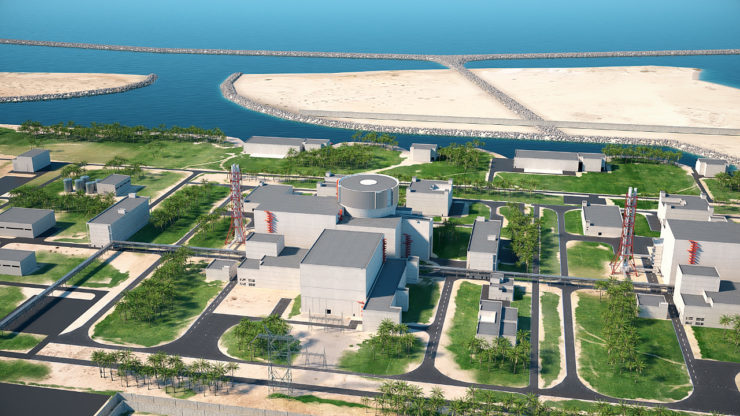
Africa is the fastest-growing energy market in the world. The continent is on the verge of geometric economic growth, but until recently, almost 1.5 billion people had no access to domestic electric power. Various investments, initiatives, and projects by Russia, China, and other nations now vie for top positions geostrategically and economically.
At a plenary session of Russian Energy Week in October, President Vladimir Putin stressed the necessity for Russia to ensure energy security on the old continent. The Russian leader spoke of the comprehensive Russia-Africa energy cooperation. As a point of reference, Mr. Putin mentioned Egypt’s EL Dabaa NPP, the construction of which is currently ahead of schedule. El Dabaa is a template for what Russia and Egypt hope will be the “silver bullet” African nations desperately need to surmount current and future energy needs. The nuclear power plant’s financing, construction, and long-term importance are interesting for many reasons.
The Russians are genuinely cooperating with Egyptian specialists to not only build a critical energy production facility. This plant is being built from scratch, and the program behind El Dabaa includes training, maintenance support, and aspects that will help guide Egypt into sovereign energy development for the next century. Ket to this new cooperative initiative is a low-interest Russian loan of roughly $25 billion to complete the $30 billion project. However, the Rosatom-backed project’s potential is invaluable monetary and geopolitical. Construction of all four units at the El Dabaa Nuclear Power Plant (NPP) is expected to be completed by 2028-2029. But even before the plant’s launch, Vladimir Putin expects Russia’s initiative to branch out.
The integrated and systemic approach by the Russians translates into a fantastic competitive advantage. This and other advantages were highlighted by Putin at the sixth Russian Energy Week (REW) themed, ”The New Reality of Global Energy: Building the Future.” Some 4,000-plus participants from more than 60 countries attended as the Russian president laid out an energy future that will only be possible with the cooperative approach the Russian efforts welcome and incorporate.
For many experts, safe nuclear power is the best answer to the world’s energy needs and reverses the harmful impacts that threaten accelerated global warming. While China and India have solar power projects ramping up in Africa, nuclear is the only solution that averts what I would call “over engineering” for our energy needs. China, India, and Russia have hydroelectric interests in Africa. However, as we’ve seen in North America and elsewhere, the negative aspects of giant hydro plants, compared to the relatively minuscule energy outputs, are even worse than wind farms.
To date, Rosatom has bilateral agreements with nearly 20 African countries. If the original deal can be redrawn, one project in South Africa could alleviate the severe power crunch this key BRICS nation suffers from. Crippling blackouts and power outages curtail industrial growth in South Africa and across the continent. If South Africa can replicate the ongoing success and eventual launch of a plant like El-Dabaa, the result will be an economic and social miracle. El-Dabaa incorporates the most advanced technology available anywhere on Earth. The plant’s generating capacity is equivalent to 1200 MW per unit using generation III+ VVER-1200 reactors (pressurized water reactors). Four units are under various stages of completion.
Only recently, Burkina Faso, Mali, Zimbabwe, and Ethiopia signed nuclear energy cooperation agreements. Russia’s dominance in this space is so striking that Washington think-tanks and the Western power elites seem panic-stricken. In September, the Jamestown Foundation republished an article from the Eurasia Daily Monitor entitled “Russia Eyes Civilian Nuclear Markets in Africa.” The piece is a denial template similar to the stories about how Putin would never finish the Kerch Bridge project. Competition from the West has digressed to the point where negative propaganda and global thermonuclear war are the only strategies left. If Russia and Rosatom can overcome the legal battles holding up NPP construction in South Africa, an El-Dabba prototype will jumpstart an inestimable economic and social growth case. This interview with the CEO of Rosatom Central and Southern Africa, Ryan Collyer, highlights most of the facts.
The future of Africa and the wider world will be determined by multipolar input, cooperation, and applying the right technologies/strategies. Right now, Africa and the world are in desperate need of a silver bullet to slay a raging monster: inadequate models. The Russians may possess just such a solution.
Phil Butler, is a policy investigator and analyst, a political scientist and expert on Eastern Europe, he’s an author of the recent bestseller “Putin’s Praetorians” and other books. He writes exclusively for the online magazine “New Eastern Outlook”.